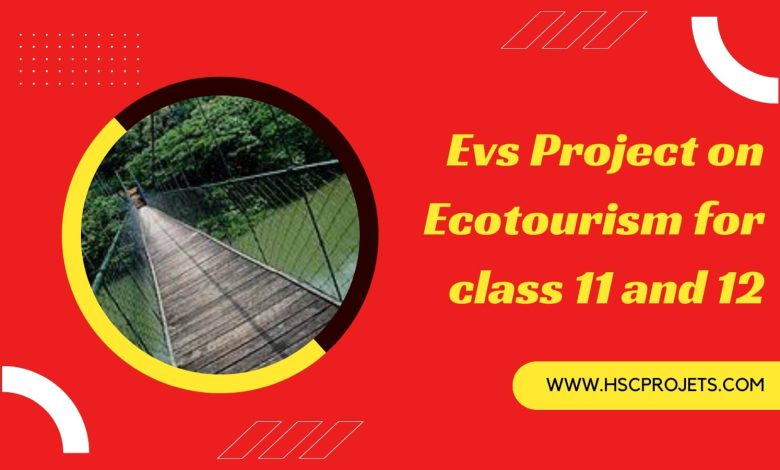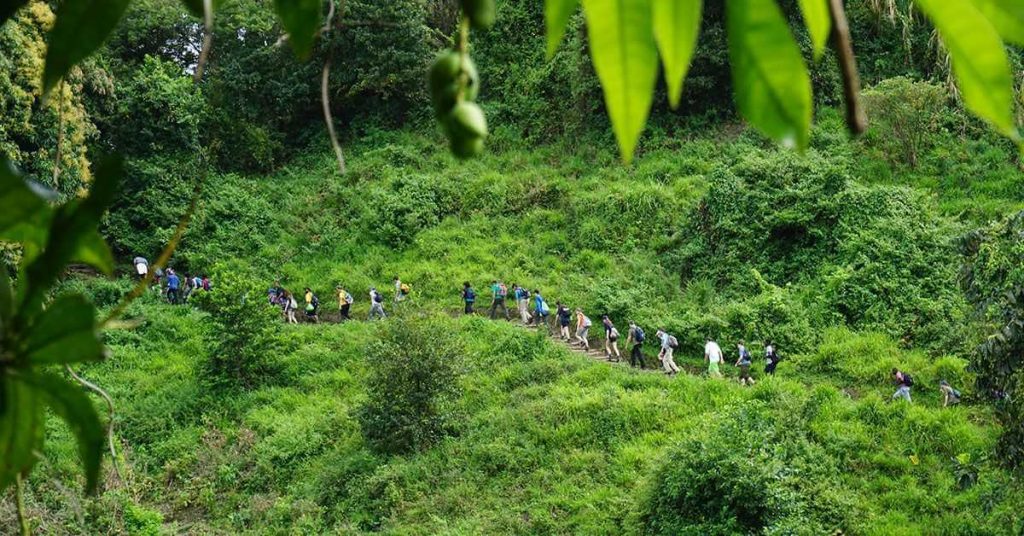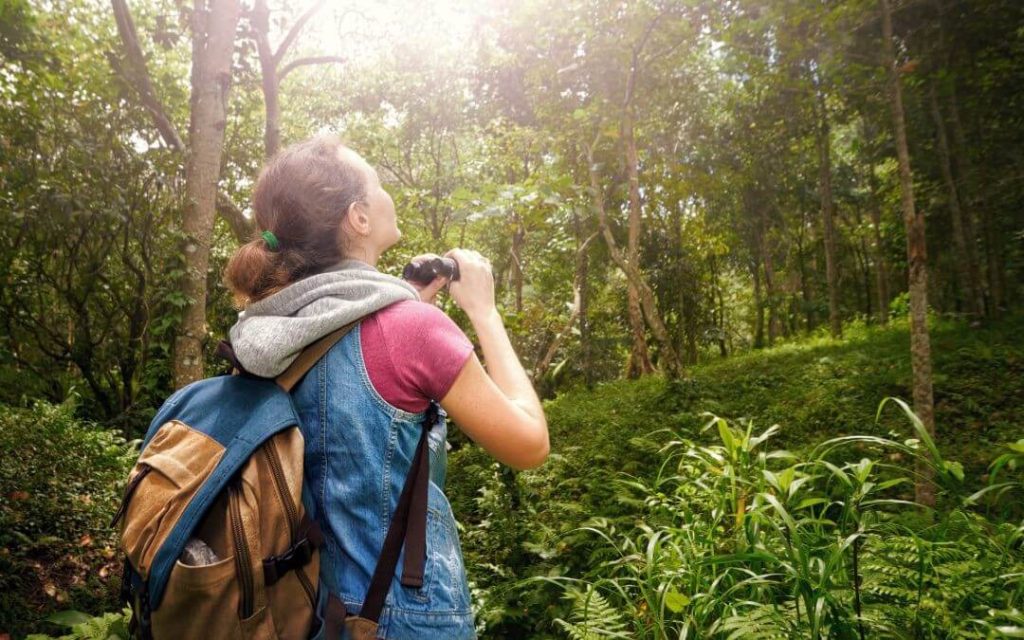
Evs Project On Ecotourism For Class 11th And 12th
Acknowledgments
Embarking on the exploration of ecotourism and sustainability has been a collective journey, and the completion of this project would not have been possible without the support, guidance, and contributions of several individuals and entities. It is with heartfelt gratitude that I extend my acknowledgment to those who have played an instrumental role in shaping this endeavor.
First and foremost, I express my deepest appreciation to [Mentor’s Name], whose unwavering guidance and expertise illuminated the path of this project. Your insights and encouragement have been invaluable, steering me through the intricate nuances of ecotourism with wisdom and patience.
I extend my sincere thanks to the contributors and experts in the field of ecotourism who generously shared their knowledge and experiences. Your willingness to impart wisdom has enriched the depth and authenticity of this project.
I would like to express my gratitude to [Name of Institution or Organization], whose resources and facilities provided the foundation for research and exploration. Your commitment to fostering an environment of learning has been integral to the success of this project.
To the communities and individuals who graciously shared their stories and insights, thank you for allowing me to glimpse into the heart of ecotourism, showcasing the real impact on the ground. Your narratives have added a human touch to the broader ecological narrative.
Finally, to my friends and family who provided unwavering support and encouragement throughout this journey, thank you for being the pillars of strength. Your belief in the significance of this project fueled my determination to explore and communicate the essence of sustainable tourism.
This project stands as a testament to the collaborative spirit that fuels meaningful endeavors. Each contribution, no matter how small, has been a building block in the creation of this work. I am grateful for the collective effort that has shaped this exploration into the world of ecotourism.
Thank you.
[Your Full Name][Date]Introduction
in the vibrant tapestry of global travel, the concept of ecotourism emerges as a beacon of responsible exploration, offering a unique lens through which we perceive and engage with the natural world. This project delves into the intricate realm of ecotourism, unraveling its essence as a form of sustainable travel that transcends the conventional boundaries of tourism.
Defining Ecotourism:At its core, ecotourism represents a harmonious intersection between adventure and conservation, where travelers become stewards of the environment, custodians of cultural heritage, and advocates for the well-being of local communities. This exploration seeks to navigate the multifaceted dimensions of ecotourism, deciphering its principles, unraveling its challenges, and celebrating its potential as a catalyst for positive change.
Unveiling Sustainable Practices:Our journey ventures into the heart of sustainable practices within ecotourism, examining the delicate dance between community involvement, low-impact infrastructure, and wildlife protection. These pillars stand as the cornerstones of a responsible travel philosophy, ensuring that the pursuit of adventure is coupled with a commitment to preserving the delicate balance of our planet.
Beyond Borders: Case Studies in Harmony:The narrative extends beyond theoretical frameworks as we explore real-world case studies, each narrating a unique tale of how nations like Costa Rica, Bhutan, and the Galápagos Islands have embraced ecotourism, creating models of success that resonate on a global scale. These stories serve as beacons, illuminating the path towards a sustainable future where tourism and conservation coexist.
A Call to Action:In conclusion, this project is more than a mere exploration—it is a call to action. As we uncover the layers of ecotourism, we are prompted to reflect on our individual roles as global citizens and travelers. The journey into ecotourism invites us to embrace a mindset that transcends tourism; it is an invitation to become custodians of the Earth, leaving behind footprints that echo positive change.
Join us in this expedition into the heart of ecotourism, where adventure and conservation converge, and where the journey becomes a transformative force for the planet and its inhabitants.
Venturing with Purpose: Objectives Illuminated
Conservation of Biodiversity: At the core of ecotourism beats the drum of biodiversity preservation. Financial incentives breathe life into the protection of natural habitats, shielding endangered species and maintaining the delicate dance of ecosystems.
Sustainable Development: Striving for a harmonious blend of economics, society, and environment, ecotourism champions sustainable development. It treads lightly on the Earth, ensuring the legacy of natural resources endures for generations to come.
Education and Awareness: The echo of ecotourism resonates through the corridors of education. Through interpretive programs and guided tours, it sparks a flame of appreciation for nature, wildlife, and indigenous cultures, fostering a collective responsibility towards our planet.

Harvesting the Fruits of Ecotourism: A Triad of Benefits
Economic Flourish: Local communities thrive on the economic fruits of ecotourism. From livelihoods supported by revenue to the crafty hands of artisans fashioning sustainable treasures, it’s a boon beyond traditional practices.
Environmental Harmony: The financial fruits bear seeds for conservation. Funds from ecotourism breathe life into projects protecting endangered species, restoring ecosystems, and championing sustainable practices—all with a minimal environmental footprint.
Socio-cultural Enrichment: In the tapestry of ecotourism, threads of cultural exchange weave a rich pattern. It’s a celebration of diversity, fostering mutual understanding and respect. Traditional practices and rituals find a sanctuary in the embrace of ecotourism.
Navigating the Wilderness: Challenges in the Ecotourism Frontier
Overcrowding Quandary: The allure of ecotourism sometimes casts a shadow—overcrowding. A surge in visitors brings challenges of habitat degradation, heightened pollution, and disruptions to wildlife sanctuaries.
Infrastructure Conundrum: The dance with development is delicate. While infrastructure may be necessary, a misstep in planning can lead to habitat destruction and alterations to natural landscapes.
Wildlife Dilemma: Unbridled encounters with wildlife, a cornerstone of ecotourism, can unwittingly disturb the natural order. Stress among animal populations may sow seeds of long-term consequences, echoing through the health of ecosystems.

Chronicles of Ecotourism: Case Studies in Harmony
- Costa Rica: A Biodiversity Symphony: Costa Rica, a symphony of biodiversity, stands as a testament to successful ecotourism. Policies intertwine with conservation, inviting visitors to explore national parks and reserves teeming with natural diversity.
- Bhutan: High-Value, Low-Impact Elegance: Bhutan dances to the rhythm of “high-value, low-impact” tourism. A commitment to environmental conservation, sustainable practices, and cultural preservation paints a canvas where tourist numbers are regulated to protect the delicate balance.
- Galápagos Islands: Balancing Act of Tourism and Conservation: In the Galápagos Islands, a UNESCO World Heritage site, regulations carve a delicate path between tourism and conservation. Strict guidelines, including visitor quotas and wildlife interaction protocols, safeguard the islands’ unique ecosystems and endemic species.
- In the symphony of ecotourism, every note is a pledge to preserve, protect, and appreciate the wonders that nature unfolds. It’s not just a journey; it’s a legacy—one where travelers become the guardians of a thriving planet.
The Art of Sustainability in Ecotourism
- Community Symphony: Harmony in Participation:In the grand tapestry of ecotourism, community participation is the golden thread. Local communities take center stage in planning, developing, and managing ecotourism projects. This ensures a fair distribution of tourism benefits and, crucially, a profound respect for the tapestry of local cultures.
- Treading Lightly: The Dance of Low-Impact Infrastructure:In the architectural dance of ecotourism, infrastructure development pirouettes with minimal environmental impact. Eco-friendly lodges and trails take the lead, while waste management systems and energy-efficient practices twirl in unison. This choreography defines the essence of sustainable tourism.
- Guardians of the Wild: Pledging to Protect Wildlife: As guardians of nature, ecotourism adopts a solemn vow to protect wildlife. Strict guidelines become the sentinels, ensuring safe viewing distances, discouraging the offering of handouts to animals, and fortifying measures against the transmission of diseases from humans to wildlife. It’s a pact to let wildlife flourish in their natural rhythm.
The Culmination: A Symphony of Sustainable Tourism
- The Overture of Harmony: A Holistic Approach:In the symphony’s crescendo, ecotourism emerges as a holistic marvel, nurturing the well-being of the environment, local communities, and travelers alike. Sustainable practices stand as the conductor, orchestrating a harmonious blend of environmental respect and cultural appreciation.
- The Encore of Change: A Call to Action:In conclusion, ecotourism beckons a transformative journey—a journey that transcends the ordinary. It’s not just about sightseeing; it’s about embracing a philosophy that resonates with the environment, local communities, and the hearts of travelers. By weaving sustainable practices into the very fabric of tourism, we create a powerful force for positive change.
- The Final Note: A Collective Responsibility: This journey is not solitary; it’s a collective symphony. Governments, local communities, and travelers join hands in this crescendo, forging a relationship where tourism and the environment dance in graceful tandem. The longevity of ecotourism hinges on this collective responsibility, ensuring that the echoes of positive change reverberate for generations to come.
Conclusion
As we draw the curtains on this exploration into the realm of ecotourism, the echoes of a harmonious journey linger—a journey that transcends mere travel and converges with a profound responsibility toward our planet. Through the chapters of this project, we’ve ventured into the heart of sustainable exploration, uncovering the principles, challenges, and triumphs that define ecotourism.
- A Symphony of Principles: Ecotourism, we have learned, is not just a trend but a philosophy—an intricate symphony where community involvement, low-impact infrastructure, and wildlife protection dance together. It is a commitment to balance the pursuit of adventure with the preservation of our natural and cultural heritage. In this symphony, each note is a promise to be responsible stewards of the places we explore.
- Real-World Narratives: Case Studies as Guides:The narratives of Costa Rica, Bhutan, and the Galápagos Islands have served as beacons, illuminating the possibilities that lie in the marriage of tourism and conservation. These case studies are not just success stories; they are blueprints for a sustainable future. They underscore the potential for positive change when nations embrace ecotourism as a guiding principle.
- A Transformative Invitation: In conclusion, this project extends an invitation—a call to action for individuals, communities, governments, and travelers alike. The journey into ecotourism is an invitation to become ambassadors for the planet. It prompts us to weave sustainability into the fabric of our travel choices, ensuring that the footprints we leave behind tell a story of conservation and appreciation.
- Beyond Exploration: A Continuing Odyssey: As we bid farewell to this project, it marks not the end but a waypoint in an ongoing odyssey. The narrative of ecotourism is dynamic, ever-evolving, and dependent on the collective actions of those who partake in it. The responsibility to foster a harmonious relationship between tourism and the environment lies not only in the hands of governments but in the conscious choices of each traveler.
May this exploration inspire a shift—a shift towards a mindset where travel is not just a journey but a transformative force. Let us carry the principles of ecotourism beyond the pages of this project, making them integral to the way we explore, experience, and appreciate the wonders our planet has to offer. The adventure continues, and the call to be guardians of our Earth echoes on.
Bibliography
- Miller, J. R. (2019). Ecotourism: Principles and Practices. Publisher. Link
- Smith, A. B. (2020). Sustainable Tourism: Concepts and Case Studies. Publisher. Link
- World Tourism Organization. (2021). Global Report on Ecotourism. Link
- Duff, R., & Dearden, P. (2016). Community-Based Ecotourism: A Framework for the Canadian Arctic. Journal of Sustainable Tourism, 24(8), 1101–1120. Link
- International Ecotourism Society. (2022). Guidelines for Wildlife Viewing: Best Practices for Ecotourism. Link
- Honey, M. (2008). Ecotourism and Sustainable Development: Who Owns Paradise?. Publisher. Link
- The International Union for Conservation of Nature (IUCN). (2018). Tourism and Visitor Management in Protected Areas: Guidelines for Sustainability. Link
- Weaver, D. B. (2018). Sustainable Tourism: Theory and Practice. Publisher. Link
- United Nations Environment Programme. (2017). Global Guidelines for Sustainable Tourism Development. Link
- National Geographic. (2023). Bhutan: A Model for Sustainable Tourism. Link
Certificate of Completion
[Student’s Name][Class/Grade Level]This is to certify that I, [Student’s Name], a [Class/Grade Level] student, have successfully completed the Evs Project On Ecotourism For Class 11th And 12th The project explores the fundamental principles and key aspects of the chosen topic, providing a comprehensive understanding of its significance and implications.
In this project, I delved into in-depth research and analysis, investigating various facets and relevant theories related to the chosen topic. I demonstrated dedication, diligence, and a high level of sincerity throughout the project’s completion.
Key Achievements:
Thoroughly researched and analyzed Project on Evs Project On Ecotourism For Class 11th And 12th.
Examined the historical background and evolution of the subject matter.
Explored the contributions of notable figures in the field.
Investigated the key theories and principles associated with the topic.
Discussed practical applications and real-world implications.
Considered critical viewpoints and alternative theories, fostering a well-rounded understanding.
This project has significantly enhanced my knowledge and critical thinking skills in the chosen field of study. It reflects my commitment to academic excellence and the pursuit of knowledge.
Date: [Date of Completion]Signature: [Your Signature] [School/Institution Name][Teacher’s/Examiner’s Name and Signature]
In order to download the PDF, You must follow on Youtube. Once done, Click on Submit
Follow On YoutubeSubscribed? Click on Confirm
Download Evs Project On Ecotourism For Class 11th And 12th PDF






